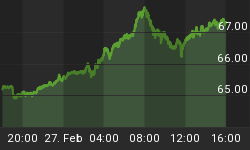It was no fun investing in precious metals for most of 2011-2015, but the past few months have sure been a blast for buy-and-hold investors. Silver prices are 22.5% year to date, and gold isn't far behind.
Now that there are some profits available to take, some metals investors wonder if they should grab them. The answer for most people is not yet -- not even close.
Yes, there are gains. But the real question for investors isn't whether or not there are profits, it's whether there are better options for their investment dollars. What other assets have a better risk/reward profile? Cash? Stocks? Bonds? No thank you!
Central planners at the Federal Reserve and perma-bulls on Wall Street keep telling us the world is fixed, but a whole lot of us aren't buying it. The focus remains on picking the right safe-haven asset for what promises to be volatile times.
And picking it ahead of the crowd means positioning yourself for profits as other investors flock to safety behind you.

The U.S. stock market is just a pinch below all-time highs. Current stock prices have less to do with corporate profits and more to do with bubbles and inflation. The price-to-earnings ratio across the S&P 500 index has only been higher on a handful of occasions. And each time, a high PE ratio was a signal for investors to sell, not buy.
Investors might consider the traditional safe-haven alternatives to precious metals - cash and bonds, particularly U.S. Treasuries. Unfortunately, there are no bargains in those markets either. Bond yields are near historic lows, and cash still yields next to nothing.
Not to mention that government and central bank policy which is hell-bent on creating inflation makes any bet on these paper assets a guaranteed loser over time.
Today, the U.S. government carries more than $100 trillion in combined debt and entitlement obligations, and the meter just continues to run. Almost no one expects politicians to eliminate deficits or cure the metastasizing growth of programs such as Social Security or Medicare.
You Are Being Targeted for "Financial Repression"
Officials have clearly signaled their preferences when it comes to dealing with these obligations: devalue the dollar and suppress interest rates. This is also known as "financial repression," a condition where savers are punished with negative real rates of return.
Until that changes, investors should avoid holding a large amount of U.S. dollars or, even worse, fixed-rate debt. Now is the time to favor bullion and other tangible assets instead.

If another asset appears better positioned to deliver capital preservation or if the risks to capital fade, it will be time to sell some of your physical gold and silver. For now, the risks are extreme, and most other options look unattractive.
Here are a few signs which would signal it is time to lighten up on precious metals:
-
Positive real interest rates. Negative real interest rates (i.e. interest rates that are below the inflation rate) destroy savings. Three-month T-bills currently offer 0.23%. That makes the real interest rate substantially negative, even using the government's politically manipulated Consumer Price Index (CPI) figure. T-bills and other interest-bearing vehicles won't be an attractive alternative to physical gold until their real yields turn positive.
-
An end to permanent deficit spending. Our government has been consistently spending more than it collects in taxes for decades. With every dollar borrowed comes additional incentive to stay the course on dollar devaluation, the preferred long-term strategy for dealing with suffocating debt repayment and overwhelming entitlement obligations.
-
A Dow:gold ratio of 5:1 or less. At the climax of the last secular bull market in gold in 1980, one ounce of gold could buy one theoretical share of the Dow Jones Industrials. Right now, it would take 14.6 ounces of gold. As the precious metals bull market resumes, history tells us that gold (and silver) will outperform the general stock market by many multiples. Of course, everyone must assess the situation for themselves, accounting for their own personal circumstances. Individuals may find good reasons to sell metals and raise cash; an emergency, buying a home, etc.
As it stands today, we're currently a very long way from meeting the above criteria. The fundamentals therefore favor accumulating precious metals, making now a good time for investors to focus on their entrance strategy, not their exit strategy.















